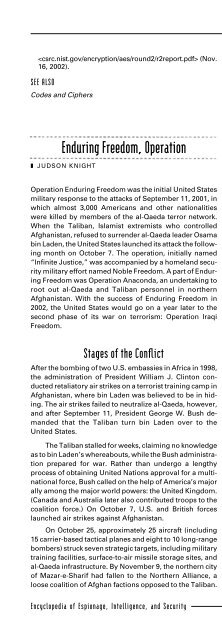ENCYCLOPEDIA OF Espionage, Intelligence, and Security Volume ...
ENCYCLOPEDIA OF Espionage, Intelligence, and Security Volume ...
ENCYCLOPEDIA OF Espionage, Intelligence, and Security Volume ...
Create successful ePaper yourself
Turn your PDF publications into a flip-book with our unique Google optimized e-Paper software.
Enduring Freedom, Operation (Nov.16, 2002).SEE ALSOCodes <strong>and</strong> CiphersEnduring Freedom, Operation❚ JUDSON KNIGHTOperation Enduring Freedom was the initial United Statesmilitary response to the attacks of September 11, 2001, inwhich almost 3,000 Americans <strong>and</strong> other nationalitieswere killed by members of the al-Qaeda terror network.When the Taliban, Islamist extremists who controlledAfghanistan, refused to surrender al-Qaeda leader Osamabin Laden, the United States launched its attack the followingmonth on October 7. The operation, initially named“Infinite Justice,” was accompanied by a homel<strong>and</strong> securitymilitary effort named Noble Freedom. A part of EnduringFreedom was Operation Anaconda, an undertaking toroot out al-Qaeda <strong>and</strong> Taliban personnel in northernAfghanistan. With the success of Enduring Freedom in2002, the United States would go on a year later to thesecond phase of its war on terrorism: Operation IraqiFreedom.Stages of the ConflictAfter the bombing of two U.S. embassies in Africa in 1998,the administration of President William J. Clinton conductedretaliatory air strikes on a terrorist training camp inAfghanistan, where bin Laden was believed to be in hiding.The air strikes failed to neutralize al-Qaeda, however,<strong>and</strong> after September 11, President George W. Bush dem<strong>and</strong>edthat the Taliban turn bin Laden over to theUnited States.The Taliban stalled for weeks, claiming no knowledgeas to bin Laden’s whereabouts, while the Bush administrationprepared for war. Rather than undergo a lengthyprocess of obtaining United Nations approval for a multinationalforce, Bush called on the help of America’s majorally among the major world powers: the United Kingdom.(Canada <strong>and</strong> Australia later also contributed troops to thecoalition force.) On October 7, U.S. <strong>and</strong> British forceslaunched air strikes against Afghanistan.On October 25, approximately 25 aircraft (including15 carrier-based tactical planes <strong>and</strong> eight to 10 long-rangebombers) struck seven strategic targets, including militarytraining facilities, surface-to-air missile storage sites, <strong>and</strong>al-Qaeda infrastructure. By November 9, the northern cityof Mazar-e-Sharif had fallen to the Northern Alliance, aloose coalition of Afghan factions opposed to the Taliban.Encyclopedia of <strong>Espionage</strong>, <strong>Intelligence</strong>, <strong>and</strong> <strong>Security</strong>Four days later, a combination of allied air assaults <strong>and</strong>ground maneuvers by the Northern Alliance forced theTaliban to surrender Kabul, the capital, <strong>and</strong> on November17, the Taliban confirmed that al-Qaeda military chiefMohammed Atef had been killed in the allied bombing.Near the beginning of the war’s eighth week, onNovember 25, Central <strong>Intelligence</strong> Agency officer Johnny“Mike” Spann became the first combat casualty when hewas killed in an uprising at Mazar-e-Sharif. Three U.S.soldiers were killed, <strong>and</strong> 19 wounded, when a U.S. bombmissed its target on December 2.In December 2001, one dramatic phase of the warended as the Taliban surrendered their last major strongholdin the southern city of K<strong>and</strong>ahar on December 7. Bothbin Laden <strong>and</strong> Taliban leader Mullah Muhammad Omarapparently escaped from the city. December 16 saw thefall of Tora Bora, a cave complex where al-Qaeda <strong>and</strong>Taliban holdouts had hidden. Six days later, on December22, Hamid Karzai was sworn in as chairman of a six-monthinterim government. Women, treated as slaves underTaliban rule, could again vote, participate in government,<strong>and</strong> receive an education.Early 2002: Operation Anaconda. On January 4, 2002, U.S.Army Sergeant First Class Nathan Ross Chapman becamethe first member of the U.S. military to be killed by hostilefire. Fighting continued in spurts until March 2, the launchof Operation Anaconda. The largest ground operation ofthe war, Anaconda involved some 2,000 U.S., Afghan, <strong>and</strong>allied troops, <strong>and</strong> would result in eight U.S. deaths. Itspurpose was to eliminate Taliban <strong>and</strong> al-Qaeda fightersstill holding out in the mountains of southeastern Afghanistan.But as the mission came to a close some two weekslater, assessment of its success was difficult.Over the course of an 11-day battle near Shah-i-Kot,for instance, U.S. military comm<strong>and</strong>ers had been forced toreassess original estimates of enemy strength in the regionupward from 150 or 200 to 1,000. As that part of theoffensive came to a close on March 17, it appeared that theU.S. military had produced as many as 800 enemy casualties,but numbers were difficult to determine. In any case,civilian <strong>and</strong> military leaders were not inclined to evaluatethe offensive in terms of body counts—a lesson learnedfrom the Vietnam War a generation earlier.Infinite Justice <strong>and</strong> Noble Eagle. Enduring Freedom, as thelarger operation came to be known in November, wasinitially called Infinite Justice. The change resulted fromconcerns that the original name had religious connotations,suggesting that God was on the side of the coalitionforces. (Similarly, in the wake of the September 11 attacks,Bush had once mentioned a “crusade,” an unfortunatechoice of words that played right into the terrorists’ claimsthat the war on terrorism was an attack by Christiansagainst Islam.). Still, the coalition took extraordinary measures,including dropping thous<strong>and</strong>s of leaflets <strong>and</strong> radio397







![The Big Lie 9-11 and Government Complicity in Mass Murder [PDF]](https://img.yumpu.com/50957077/1/190x245/the-big-lie-9-11-and-government-complicity-in-mass-murder-pdf.jpg?quality=85)








